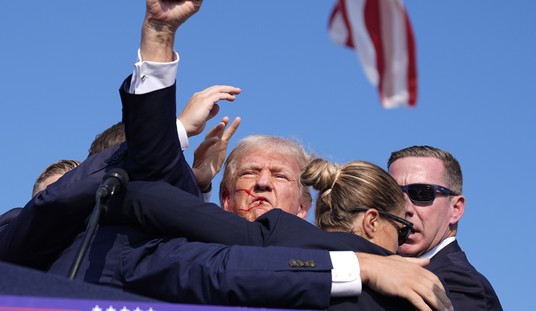The congressional hearings into the State Department’s handling of its consulate in Benghazi can become either one of two things: an inquiry into the specific handling of the security at that station or an examination of the Administration’s Middle Eastern policy. Politics will mean the emphasis will be on the former, but the pressing need is for a debate on the latter.
The narrative for the first line of inquiry was provided by the Washington Post’s Ann Gearan. “The fatal attack on a U.S. diplomatic compound in Libya last month has become a test of Secretary of State Hillary Rodham Clinton’s leadership and a threat to her much-admired legacy as America’s top diplomat just a few months before she plans to step down.”
In the short run it will be all about trying to “get” somebody. From the administration standpoint it will be a search for someone to take the fall.
But the effect of the debacle in Benghazi may have been to make the administration heighten its doubts over the endpoint of the ‘Arab Sprng’.
RIYADH, saudi Arabia — For months, Saudi Arabia and Qatar have been funneling money and small arms to Syria’s rebels but have refused to provide heavier weapons, such as shoulder-fired missiles, that could allow opposition fighters to bring down government aircraft, take out armored vehicles and turn the war’s tide.
While they have publicly called for arming the rebels, they have held back, officials in both countries said, in part because they have been discouraged by the U.S., which fears that the heavier weapons could end up in the hands of terrorists. …
U.S. support for such weapons transfers is unlikely to materialize any time soon. President Barack Obama’s administration has made clear that it has no desire to deepen its efforts, mostly providing logistical support for the rebels.
Administration officials would not comment on what they are telling their Persian Gulf allies about arming the rebels.
That is a polite way of saying they are too scared to go forward and too frightened to turn back. The tour is going places they don’t like but its too embarrassing to cancel the trip. The fundamental problem with “leading from behind” is now fully evident: somebody else is driving. The Syrian situation is developing without the US being able to directly influence the result. As a result all they can do is firewall it from every side. The US is now bolstering Jordan.
BRUSSELS (AP) — The United States has sent military troops to the Jordan-Syria border to bolster that country’s military capabilities in the event that violence escalates along its border with Syria, Defense Secretary Leon Panetta said Wednesday.
Speaking at a NATO conference of defense ministers in Brussels, Panetta said the U.S. has been working with Jordan to monitor chemical and biological weapons sites in Syria and also to help Jordan deal with refugees pouring over the border from Syria. The troops are also building a headquarters for themselves.
They’re are bolstering it because they’re afraid the fire might spread. On another front Syria and Turkey are exchanging artillery fire across their common border. Another place to firewall. Meanwhile, the consequences of the administration’s Iraq policy are catastrophically unfolding.
Iraq has signed a multi-billion dollars arms contract with Russia even as Prime Minister Maliki warned Turkey against using NATO to fight Syria. The Voice of Russia gloats:
Interestingly, Iraq’s unexpectedly independent stance sheds a new light on the American occupation of Iraq and its consequences. Obviously, instead of a strong ally, free of Iranian influence and completely drawn into the orbit of American influence, Washington has got in Baghdad the exact opposite of its desires.
“Iraq is trying to get rearmed by Russia, because it was left with no defense capability after Americans left,” Sabah al-Mukhtar, the president of the Arab Lawers Association said. “It was left virtually naked in the defense sense, the Iraqis have got light firing weapons, but not much more. This situation left the country very vulnerable to Iranian influences.”
If you don’t pick up a client, someone else will.
While the focus of the Congressional hearings may be Hillary Clinton’s failure to answer the phone at the metaphorical 3 AM in the morning the more pressing issue was what she was doing while she was on the job. To uninitiated it looks like there isn’t to admire in her “much admired legacy”.
Fred Hiatt, writing in the Washington Post says there ‘is no escape from the Middle East’. In other words, leading from behind only means you have further to walk to the front when the crunch comes. Hiatt writes:
But Obama too often has left the United States on the sidelines. “It is time to focus on nation-building here at home,” he tells Americans, who understandably are receptive to that message. No doubt he’d like to focus a second term on domestic recovery and on foreign policy challenges he finds congenial: nuclear arms talks with Russia, say, as well as the pivot to Asia.
But recent events suggest that the next president, whether Romney or Obama, will get drawn into messy, difficult dilemmas in the Middle East and Central Asia. The longer a president holds America back from its expected role as leader and shaper of events, the messier the dilemmas will be.
That’s the same as saying that false cures save you nothing. In the end you have to go back to where you should have started in the first place. The Administration is in a situation similar to the doctors of a woman who was mis-diagnosed 30 times by the British National Health Service. She complained of increasing pains but “despite this, the family claim medics at Birmingham City Hospital told her it was just nerve pain.”
By the time they realized it was cancer it was too late.
The question is whether, like a public policy quack, the current administration has been prescribing snake oil instead of telling the patient the harsh truth. Whether medicines like speeches in Cairo, opportunistic credit-grabbing for an ‘Arab Spring’, a PR campaign for ‘world without nuclear weapons’, so-called grand bargains that never happened and promises to win ‘wars of necessity’ in land-locked countries reachable only through Pakistan or Russia did any good.
Because now the Washington Post is telling the public, ‘there is no escape from the Middle East’. That sounds suspiciously like “back to Square One”. Perhaps Mitt Romney hit the spot when he said “hope is not a strategy”.
I know the President hopes for a safer, freer, and a more prosperous Middle East allied with the United States. I share this hope. But hope is not a strategy. We cannot support our friends and defeat our enemies in the Middle East when our words are not backed up by deeds, when our defense spending is being arbitrarily and deeply cut, when we have no trade agenda to speak of, and the perception of our strategy is not one of partnership, but of passivity.
There are limits to what conjury can do; there are feats which spin cannot perform. Providing international security is one of them. The Greatest Generation learned that lesson the hard way. But they are gone and we’ve forgotten.
From Feb 14, 2011
http://www.youtube.com/watch?v=mvhaAO2Q17c
Belmont Commenters
How to Publish on Amazon’s Kindle for $2.99
The Three Conjectures at Amazon Kindle for $1.99
Storming the Castle at Amazon Kindle for $3.99
No Way In at Amazon Kindle $8.95, print $9.99











Join the conversation as a VIP Member